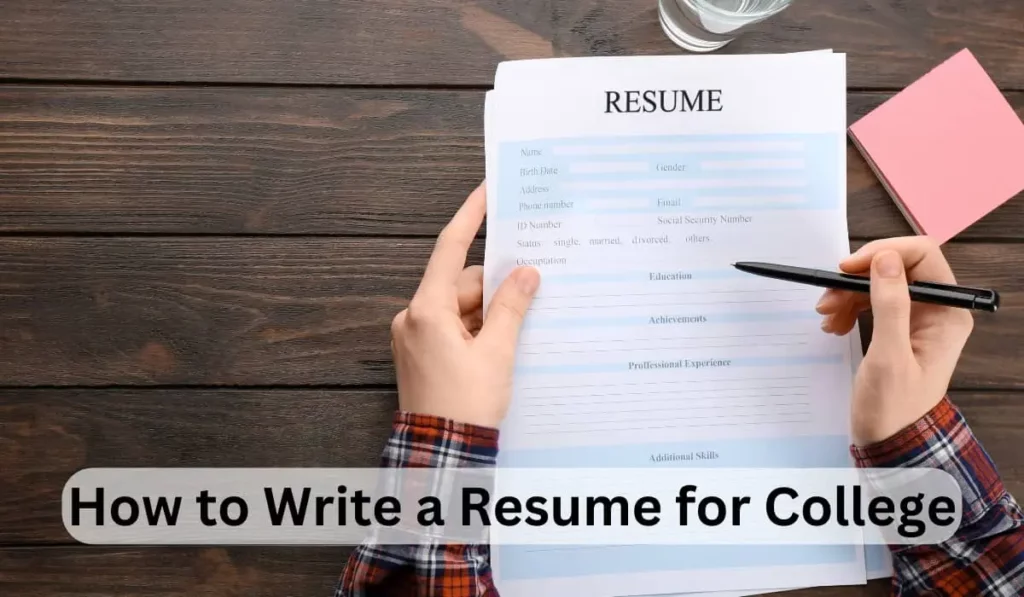Writing a resume for college applications or early career opportunities can be a challenging task for high school students and recent graduates. This comprehensive guide is designed to simplify the process, ensuring your resume stands out in a sea of applicants. A well-crafted resume can be a powerful tool in showcasing your achievements, skills, and potential, paving the way for academic and professional success.
The Importance of a College Resume
Understanding the Value
A college resume is a vital tool for students stepping into higher education and the professional world. It goes beyond a mere list of academic achievements and extracurricular activities; it’s a document that effectively communicates a student’s journey, abilities, and potential to admissions committees and future employers.
In the context of college admissions, a resume helps the admissions officers to see the candidate’s profile in a broader scope, offering a clearer picture of their personality, interests, and ambitions beyond what standardized test scores and grades can convey.
Making a Strong First Impression
In the job market, especially for internships and part-time roles often sought by college students, a resume is the first point of contact with potential employers. It serves as a personal marketing tool, highlighting the student’s skills, experiences, and readiness for the professional world.
An effective resume can significantly impact a student’s chances of landing desired opportunities, making it essential for opening doors to educational and professional advancement.
Differentiating Yourself
In an increasingly competitive academic and job market, a well-prepared resume can set a student apart from other applicants. It offers an opportunity to showcase unique experiences, such as volunteering, internships, or special projects, which might be particularly appealing to colleges or employers looking for well-rounded candidates.
By effectively presenting a combination of academic achievements, skills, and extracurricular involvement, a resume helps in building a compelling narrative about a student’s strengths and potential.
Key Elements of a College Resume
Personal Information
At the top of the resume, include essential personal information: your name, address, phone number, and a professional email address. This section should be concise and straightforward, ensuring that the reader can easily contact you.
Educational Background
The education section is critical. List your high school, expected graduation date, and GPA. Include relevant details such as honors, Advanced Placement (AP) courses, or any college-level coursework if applicable. This section can also highlight academic awards or distinctions that underscore your scholarly abilities.
Work Experience
Even if your work experience is limited, include any part-time jobs, internships, or volunteer work. Describe your role, the duration, and key responsibilities. Focus on achievements or skills gained through these experiences, such as teamwork, leadership, time management, or specific technical skills.
Extracurricular Activities
This section is your chance to showcase your involvement outside the classroom. Include clubs, sports, arts, or leadership roles in student organizations. Highlight any significant achievements or contributions in these activities, demonstrating your ability to balance multiple commitments and your engagement in diverse interests.
Skills and Achievements
List any relevant skills that would be valuable in an academic or professional setting, such as language proficiency, computer skills, or other technical abilities. Also, include a section for notable achievements that might not fit into other categories, like winning a science fair, publishing an article, or participating in significant competitions or events.
Optional Sections
Depending on your experiences, you may also include additional sections such as certifications, publications, or special projects. These can provide further insight into your abilities and interests, particularly if they are relevant to the field or institution you are targeting.
By including these key elements in your college resume, you provide a comprehensive view of your capabilities and experiences, setting the stage for successful college admissions and professional opportunities.
Crafting an Effective College Resume
Crafting an effective college resume requires strategic planning and attention to detail. Start by reflecting on your high school journey, identifying key experiences, skills, and achievements.
Tailor your resume to align with the specific requirements of colleges or jobs you are targeting. Use action verbs and quantifiable achievements to make your experiences come alive. For example, instead of saying “participated in a debate team”, say “Led a debate team to a regional victory, enhancing public speaking and critical thinking skills.”
Using SEO Techniques for Resume Optimization
In today’s digital age, optimizing your resume for search engines can be a game-changer, especially when applying for opportunities online. Incorporate relevant keywords that align with the college program or job you’re targeting.
Research the institution or company to understand their values and language, and integrate these into your resume. This SEO-focused approach increases the likelihood of your resume being noticed and shortlisted in digital application systems.
Design and Formatting Tips
The design and formatting of your resume are as important as the content. Use a clean, professional layout that is easy to read. Stick to standard fonts like Arial or Times New Roman, and keep the font size between 10-12 points.
Use bullet points for clarity, and ensure there is enough white space to make the document visually appealing. Consistency in formatting, such as using the same style of headings and bullet points throughout, is key to a polished look.
Common Mistakes to Avoid
Common mistakes can detract from the effectiveness of your college resume. Avoid overly complex language or jargon; clarity and conciseness are crucial. Steer clear of embellishing or misrepresenting your experiences and achievements, as this can harm your credibility. Also, avoid generic resumes; tailor each resume to the specific college or job you are applying for. Lastly, excessive length is a common pitfall; keep your resume to one page, focusing on the most relevant and recent experiences.
Proofreading and Editing Your College Resume
Proofreading and editing are critical steps in finalizing your college resume. Review your resume multiple times to catch any grammatical or spelling errors, as these can create a negative impression.
Seek feedback from teachers, mentors, or career counselors who can provide valuable insights. Use online tools like Grammarly for an extra layer of review. Remember, a well-edited resume reflects your attention to detail and professionalism.
Conclusion
In conclusion, writing a resume for college is a vital skill that can set the stage for your academic and professional future. A well-constructed resume showcases your strengths and achievements, making you a competitive candidate for colleges or early career opportunities.
Remember to tailor your resume, be authentic, and pay attention to detail. With these tips in mind, you’re ready to create a resume that opens doors to new possibilities and paves the way for your future success
Sources:
Simpson, A. (2023, August 5). How to Write a College Resume + Templates | College Essay Guy. College Essay Guy | Get Inspired. https://www.collegeessayguy.com/blog/college-resume-templates
Moody, J. (2021, October 22). How to Write a Resume for College. US News & World Report. https://www.usnews.com/education/best-colleges/articles/how-to-write-a-resume-for-college-admissions-scholarships-internships






